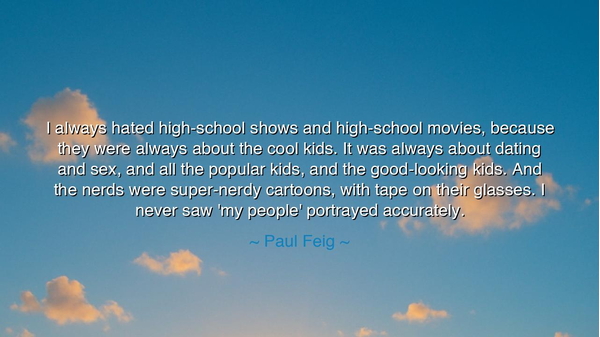
I always hated high-school shows and high-school movies, because
I always hated high-school shows and high-school movies, because they were always about the cool kids. It was always about dating and sex, and all the popular kids, and the good-looking kids. And the nerds were super-nerdy cartoons, with tape on their glasses. I never saw 'my people' portrayed accurately.






There are voices that speak for the many, and there are voices that rise for the unseen. Among them stands Paul Feig, whose words ring with the cry of the overlooked: “I always hated high-school shows and high-school movies, because they were always about the cool kids... I never saw 'my people' portrayed accurately.” In this lament, there breathes the sorrow and defiance of those long forgotten in the glittering halls of youth — the quiet, the awkward, the dreamers who stood at the edge of the crowd. Feig’s words are not merely a complaint against art; they are a call to truth, a remembrance that storytelling must honor not only the beautiful and bold, but also the shy and unseen.
From the earliest days of civilization, the storytellers were the mirrors of their age. Yet often, their mirrors reflected only the gilded few — kings, warriors, and heroes of flawless form. The humble, the strange, the outcast — these were cast aside like shadows at dusk. So too in Feig’s time, the realm of high-school stories became a shrine to popularity, a world where charm triumphed and awkwardness was made a jest. But beneath those bright screens and laughter lay a wound — the countless hearts who saw no likeness of themselves, who believed that being different meant being lesser.
Feig, through his work, sought to mend that wound. His words were born not from disdain, but from longing — a longing for authenticity, for stories that honored the truth of youth in all its fumbling grace. His creation, Freaks and Geeks, became his offering to the forgotten. In it, the outsiders were no longer caricatures with taped glasses or trembling hands; they were alive, complex, filled with hope and confusion and tenderness. Thus he restored dignity to the overlooked, showing that the uncool were not unworthy — that the truest courage is to live unpolished in a world that worships shine.
The ancients too knew this truth. Consider the philosopher Socrates, mocked by the elite for his plain face and simple ways. In a world dazzled by beauty and rhetoric, he spoke for wisdom born of humility. He too was one of “Feig’s people” — unglamorous, yet immortal. History remembers not the polished youths of Athens, but the man who questioned them, who dared to be himself when conformity was the easy road. The same spirit dwells in Feig’s words: the spirit that refuses to bend to the tyranny of the beautiful, that insists the ordinary is sacred.
To despise the narrow stories of “the cool kids” is not bitterness, but rebellion against falsehood. For the world has always been tempted to mistake surface for soul. Yet greatness often grows in the shadows, unseen by the shallow eye. Feig’s truth teaches us that laughter, love, and struggle belong to all — not just the chosen few. When we elevate the uncelebrated, we restore balance to the human tale, reminding the world that every life is a story worthy of being told.
Thus, the lesson is clear: seek authenticity, not applause. In your own life, do not chase the image of perfection that others revere. Embrace your strangeness, your softness, your imperfection — for these are the very marks of realness that art and life so desperately need. If you create, create for those like you, who have not yet seen themselves reflected in the light. If you lead, lead not as the idolized, but as one who understands the unseen.
Let the future remember that the measure of greatness is not in fame, nor beauty, nor applause, but in truth. Feig’s words remind us that the world needs not more flawless heroes, but honest mirrors — stories that tell the lonely they are not alone, that speak to the hearts that wait in silence. For when truth stands where artifice once reigned, the forgotten will finally rise, and the world will see, perhaps for the first time, that the “uncool” have always been the most human of all.






AAdministratorAdministrator
Welcome, honored guests. Please leave a comment, we will respond soon